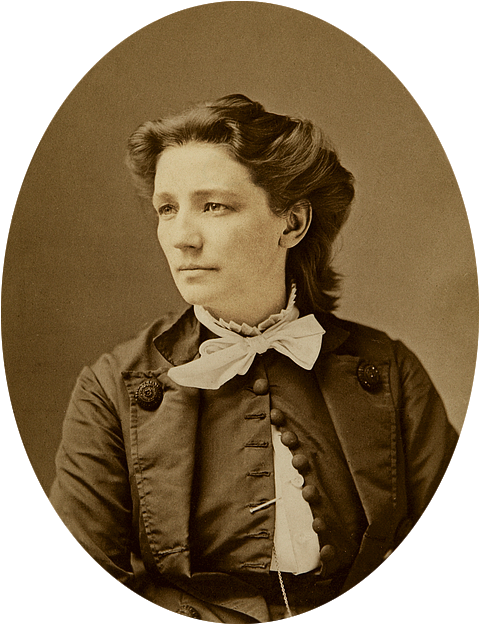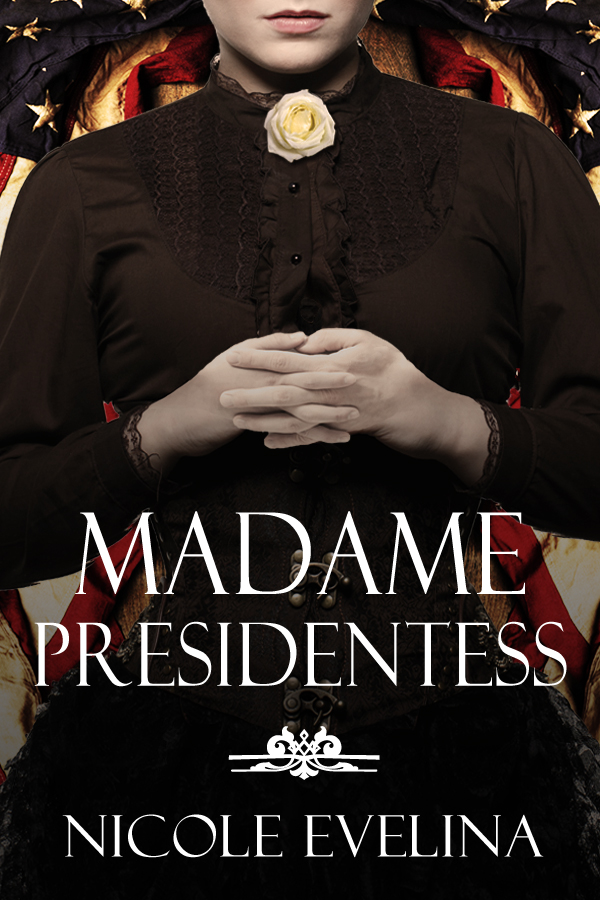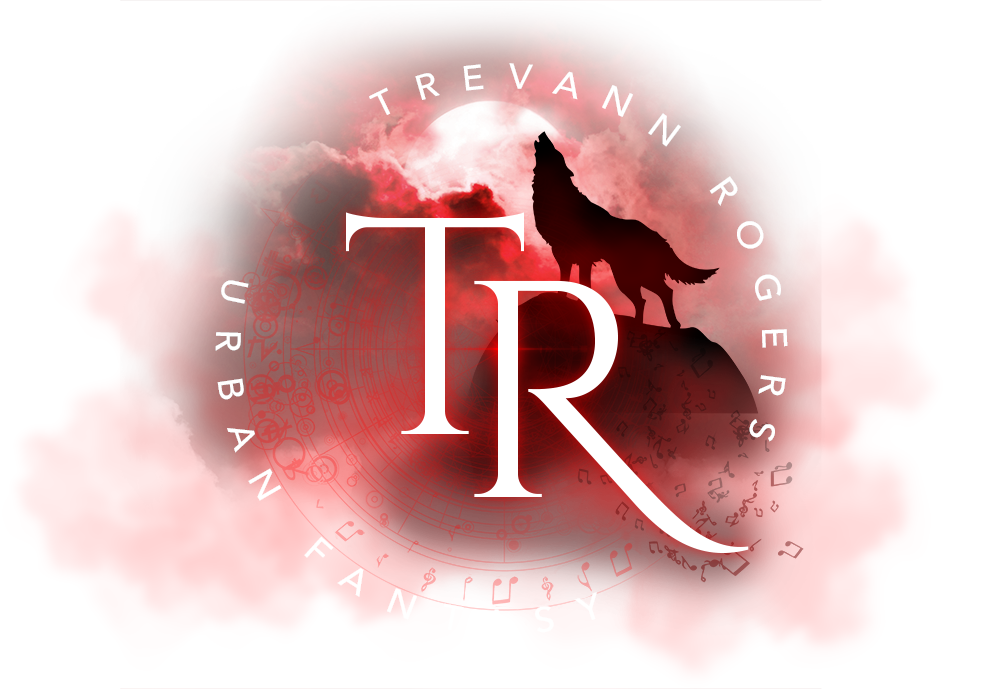Please join me in welcoming multi-award-winning writer Nicole Evelina, as she presents to us the story of an unconventional woman, Victoria Woodhull. Victoria Woodhull – Clothing as Rebellion in late 19th Century America
My latest historical fiction novel, Madame Presidentess, is about Victoria Woodhull, the first woman to run for President in the United States. Not only that, she was also the first woman to run a stock brokerage on Wall

Street (co-owned with her sister, Tennie), the first to testify before a sitting committee of Congress and one of the first to run a weekly newspaper (also with Tennie).
Given that, you may be wondering why clothes would matter in this novel. Well, Victoria was also what they called at the time a “sex radical” – that is, is she believed in the concept of Free Love. To her, the term meant that a marriage should begin when two people fell in love and end when they are no longer in love, without interference from the government. (It was difficult to get a divorce in 19th century America; in many states, the only way you could do so was by proving adultery.)
It is likely that Victoria was introduced to the Free Love movement by her second husband, Col. James Blood. As a member, she wore her hair short (at least for the time), adopted a more masculine form of dress (without the bustles and corsets common at the time) in protest of the sexual inequality between men and women.
Her sister, Tennie, joined her in this movement. On the day they first opened their Wall Street brokerage, they purposefully adopted a more masculine outfits, wearing instead of corsets and bustles, deep blue jackets embroidered with rich velvet which were broad at the shoulders, but tapered to contoured curves at the waist, over matching skirts that reached only to the tops of their shoes. That, too, was a carefully planned statement, designed to draw attention and remind onlookers that while they were too modest to show their ankles like common whores, they also were no ordinary women. They wore no ruffles, jewelry or makeup that would define them as overtly feminine, choosing for their only accessories bow ties made of silk.
Another day, Victoria is said to have shown off an outfit she wanted to wear when she was President. She shocked her friends, at least one of whom was a reporter for the New York Sun, by changing into dark blue pants that ended at the knee and were buckled over light blue stockings. On the top she wore a dark blue tunic with a man’s collar and cravat. The following exchange is said to have taken place between her and the reporter.
“This,” Victoria declared, “is what I intend to wear in the streets of New York, and at my banking house on Broad Street.”
“Mrs. Woodhull, if you appear on the street in that dress, the police will arrest you,” the reporter replied.
“No, they won’t. When I am ready to make my appearance in this dress, no police will touch me.”
And as far as records show, she was right, though it’s uncertain if she ever appeared in that particular getup in public. Victoria did later find herself in jail, but the reason had nothing to do with her clothing and everything to do with her unwillingness to keep quiet in the face of injustice and coddle those in power.
By using what she wore as an expression of what she believed, Victoria was making a strong statement of non-conformity to her time. Even when she didn’t wear outfits that we overly aligned with the sex radicals, she preferred to avoid corsets and wore no jewelry, only a white rose at her throat, which would become her trademark. So as you read Madame Presidentess, try not to picture her as a typical 19th century woman. Her hair was short, her clothes unconventional and voice loud. She was not one to be silenced then and its time her name is in the history books now.
 Madame Presidentess
Madame Presidentess
Forty-eight years before women were granted the right to vote, one woman dared to run for President of the United States, yet her name has been virtually written out of the history books.
Rising from the shame of an abusive childhood, Victoria Woodhull, the daughter of a con-man and a religious zealot, vows to follow her destiny, one the spirits say will lead her out of poverty to “become ruler of her people.”
But the road to glory is far from easy. A nightmarish marriage teaches Victoria that women are stronger and deserve far more credit than society gives. Eschewing the conventions of her day, she strikes out on her own to improve herself and the lot of American women.
Over the next several years, she sets into motion plans that shatter the old boys club of Wall Street and defile even the sanctity of the halls of Congress. But it’s not just her ambition that threatens men of wealth and privilege; when she announces her candidacy for President in the 1872 election, they realize she may well usurp the power they’ve so long fought to protect.
Those who support her laud “Notorious Victoria” as a gifted spiritualist medium and healer, a talented financial mind, a fresh voice in the suffrage movement, and the radical idealist needed to move the nation forward. But those who dislike her see a dangerous force who is too willing to speak out when women are expected to be quiet. Ultimately, “Mrs. Satan’s” radical views on women’s rights, equality of the sexes, free love and the role of politics in private affairs collide with her tumultuous personal life to endanger all she has built and change how she is viewed by future generations.
This is the story of one woman who was ahead of her time – a woman who would make waves even in the 21st century – but who dared to speak out and challenge the conventions of post-Civil War America, setting a precedent that is still followed by female politicians today.
More about Nicole
Nicole Evelina is a multi-award-winning historical fiction and romantic comedy writer. Her most recent novel, Madame Presidentess, a historical novel about Victoria Woodhull, America's first female Presidential  candidate, was the first place winner in the Women’s US History category of the 2015 Chaucer Awards for Historical Fiction.
candidate, was the first place winner in the Women’s US History category of the 2015 Chaucer Awards for Historical Fiction.
Her debut novel, Daughter of Destiny, the first book of an Arthurian legend trilogy that tells Guinevere’s life story from her point of view, was named Book of the Year by Chanticleer Reviews, took the Grand Prize in the 2015 Chatelaine Awards for Women’s Fiction/Romance, won a Gold Medal in the fantasy category in the Next Generation Indie Book Awards and was short-listed for the Chaucer Award for Historical Fiction. Been Searching for You, her contemporary romantic comedy, won the 2015 Romance Writers of America (RWA) Great Expectations and Golden Rose contests.
Nicole’s writing has appeared in The Huffington Post, Curve Magazine and numerous historical publications. She is one of only six authors who completed a week-long writing intensive taught by #1 New York Times bestselling author Deborah Harkness. As an armchair historian, Nicole researches her books extensively, consulting with biographers, historical societies and traveling to locations when possible. For example, she traveled to England twice to research the Guinevere’s Tale trilogy, where she consulted with internationally acclaimed author and historian Geoffrey Ashe, as well as Arthurian/Glastonbury expert Jaime George, the man who helped Marion Zimmer Bradley research The Mists of Avalon.
Nicole is a member of and book reviewer for The Historical Novel Society, and Sirens (a group supporting female fantasy authors), as well as a member of the Historical Writers of America, Women’s Fiction Writers Association, Romance Writers of America, the St. Louis Writer’s Guild, Women Writing the West, Broad Universe (promoting women in fantasy, science fiction and horror), Alliance of Independent Authors, the Independent Book Publishers Association and the Midwest Publisher’s Association.
Her website is http://nicoleevelina.com.
She can be reached online at:



